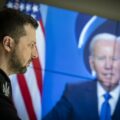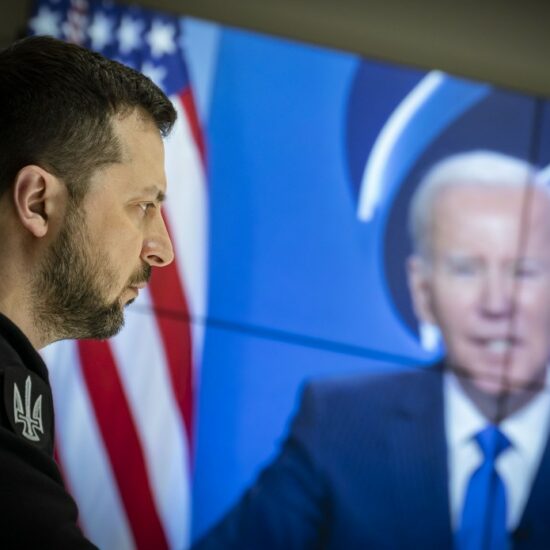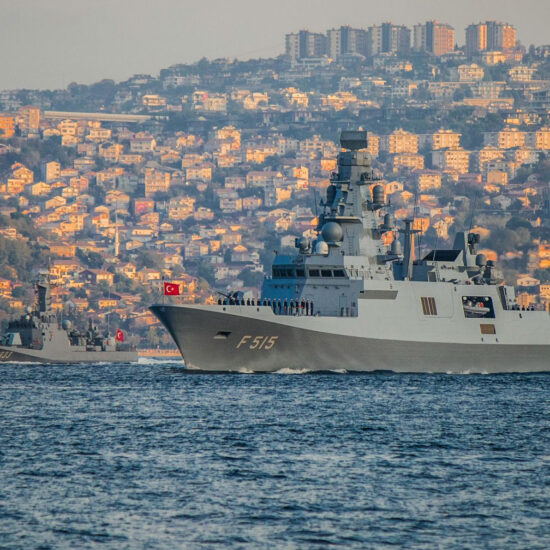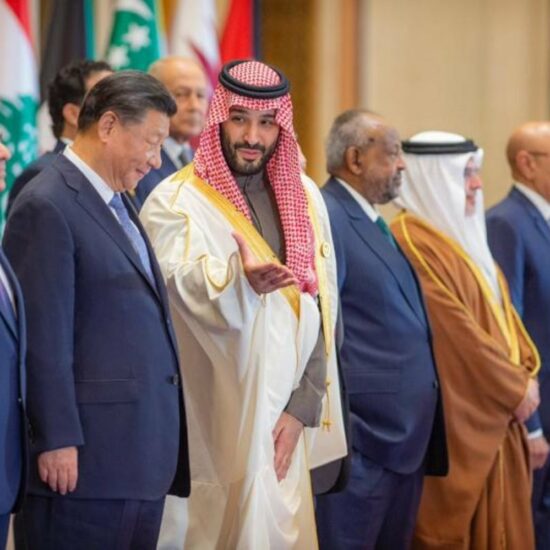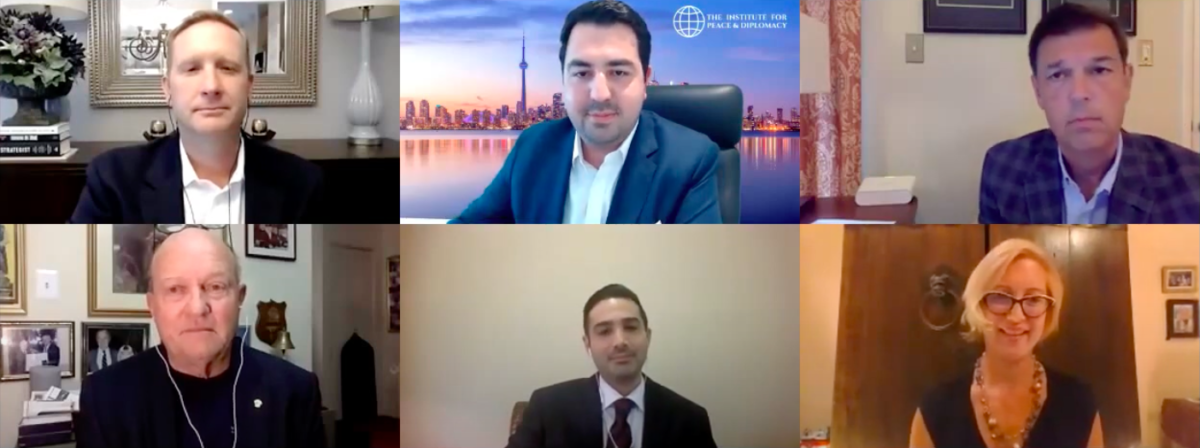
On September 9th, 2020, the Institute for Peace & Diplomacy (IPD) hosted a panel in partnership with The American Conservative. The panel was part of the launch for IPD’s International System 2050 program, as well as a discussion series by IPD about the impact of COVID-19 on global order and international peace and security. The discussion series is supported by the Department of National Defence’s Mobilizing Insights in Defence and Security (MINDS) program.
The panel discussed the state of the international system, specifically the structural shift toward a multipolar order and discussed two critical questions:
- How has the COVID-19 pandemic impacted the “liberal” world order, and accelerated trends – such as the return of great power politics, or increased skepticism about globalism – which are already transforming global geopolitics?
- Given these fundamental shifts, why and how has the “Blob” continued to persist and thrive, seemingly doubling down on old orthodoxies and sidelining new and unconventional thinking, instead of adjusting to the new reality of multipolarity and realpolitik?
Our four distinguished panelists included Christopher Preble, Co-Director at the Scowcroft Center’s New American Engagement Initiative at the Atlantic Council, George Beebe, Vice President and Director of Studies at the Center for the National Interest, Col. Lawrence Wilkerson, Senior Visiting Fellow at the Center for Study of Statesmanship, Distinguished Adjunct Professor of Government and Public Policy at the College of William & Mary, and Arta Moeini, Research Director at the Institute for Peace & Diplomacy. This panel discussion was moderated by Kelley Vlahos, Executive Director of The American Conservative.
Moderator Kelley Vlahos began the panel by discussing the global pandemic and the massive uncertainties it has caused in the economy, with much speculation about how it might affect the existing international order. At the beginning of the pandemic, many argued that it would further accelerate the shift toward a multipolar world and great power competition. What can be said about whether it has indeed created this dramatic shift six months later? What does this signal for the United States as a world leader, given the rise of tensions with China and with allies beginning to look elsewhere for guidance and leadership?
Christopher Preble responded by explaining that the U.S. is not a leader with respect to COVID, in fact doing worse than many other states. There are two ways of looking at this situation: “You can lament the fact that the U.S. is not leading or not setting the standard for dealing with the coronavirus, or you can […] celebrate the fact that countries which were once flat on their back after World War Two have taken advantage of the international system that has grown since then to create a much more resilient order that is not dependent upon the leadership of a single state any longer,” specifically citing the success of South Korea and Taiwan in containing the disease.
George Beebe explained that COVID has caused a new and possibly, inevitable, phase of great power competition, akin to the period leading up to World War One. Though this great power conflict is not inevitable, the U.S. must approach the situation in a way that reduces danger in order to avoid worst case scenarios with its primary competitors: China and Russia. The pandemic has heightened the risk of conflict because “it has laid bare some of the pre-existing trends that might have been a little obscure prior to all this and are now out in the open for everybody to see.” He added that it “has reduced trust around the world, in ways that make it a lot more difficult to manage this competition.” This is partly due to the fact that states are not operating on a common basis of fact, with the information technology revolution having a profound impact on polarization within and between countries. Governments today have different sets of information and are thus fighting over facts, with algorithms exacerbating polarized perceptions of truth. These divisions and polarizations complicate our ability to adopt a common basis for debating and formulating a coherent policy. It has also made it very difficult to manage great power competition, creating an international system increasingly vulnerable to inadvertent escalatory spirals.
Arta Moeini touched on whether America’s effort to preserve the international order by countering China and Russia would lead to a series of cold wars, if not a hot conflict which could potentially escalate into World War Three. Going beyond the institutional and financial interests, and the military-industrial-complex, he takes a generational and philosophical approach to understand the phenomenology of the Blob, the North Atlantic Foreign Policy Establishment. Its remarkable persistence can be explained by the Baby Boomer generation which “experienced the world in terms of the threat of nuclear annihilation [and] in terms of an existential crisis with the Soviet Union” during the Cold War. This was formative in creating a bipolar view of the world and in developing a Manichean, black and white, psychology of good versus evil. There is now a tendency to “restructure China’s rise into another bipolar arrangement,” which is ingrained in a sense of moral universalism and ideological absolutism. Arta believes that this breakdown of truth that George mentioned has caused the partisan debate of bipolarity to take shape in the form of Democrats’ hawkish approach to Russia and Republicans’ aggressive approach to China.
Col. Lawrence Wilkerson expressed alarm that the world has not yet seen the full extent of the pandemic and that America has handled it incompetently. The next President will have major economic and health crises on his hands, adding “to the aura of the U.S. no longer being the leader of this liberal international order.” This has produced conversation about “whether or not we should change our strategic approach to China […] to one of strategic clarity rather than the one of strategic ambiguity.” At the same time, there are two existential crises that are essential to confront, the first being nuclear weapons and the second being climate change. The Global South is already experiencing the devastating consequences of the climate crisis, which will likely cause the number of refugees to increase to 400-500 million within the next generation. Lawrence asserted that he has a problem with adopting a strategic approach to a multipolar world when the U.S. is not even able to address such nuclear and climate crises.
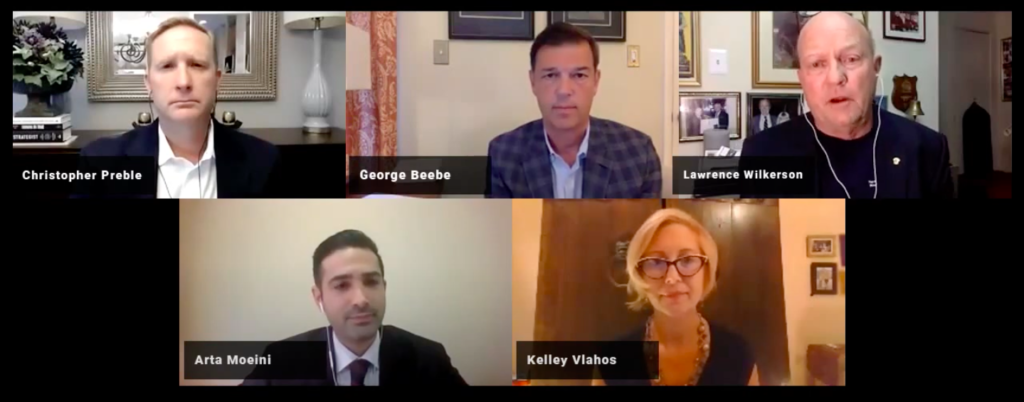
Kelley referenced an interview with John Mearsheimer in which he discussed the possible escalation of tensions between China and the U.S. that could ultimately lead to war. In response to Mearsheimer, Christopher explained that he thinks “that it is not inevitable by any stretch that China becomes the dominant power in Asia, nor […] that the only way to prevent that from happening is for the U.S. to stop it.” He added that “there are many other factors that will constrain China’s ability to maintain dominance over all of the Asia-Pacific.” There is a need to think more creatively about how the U.S., China and Asia-Pacific countries will work together to manage the risk of conflict, maintain cooperative training relationships and avoid the situation that Mearsheimer predicts.
George responded to this fear of a conflict between China and the U.S. by agreeing with Mearsheimer’s fundamental argument that the changing balance of power “is heightening the dangers of conflict between the two countries – that does not mean that conflict, actual warfare is inevitable,” as “both sides recognize the danger that a direct military clash would pose.” However, the danger is that each side might see the advantages of “chipping away margins” of the other’s power such as in the East China Sea, South China Sea or in Taiwan, which could ultimately spiral out of control. Economically, the paradox that the U.S. faces with China is that they are so entangled and intertwined, that it is not possible to disentangle them without doing serious damage to both the U.S. and the world economy. COVID has specifically shown the dangers of American dependence on Chinese medical supplies such as PPE. There must be an incremental decoupling that advances American security without causing excessive damage. Another important point is that the U.S. should learn to manage this competition, as attempting to eliminate or defeat it could pose grave and unnecessary risks.
In response to the role of America’s military in the escalating tensions with China, Lawrence stated that the military is always looking to exaggerate a threat in order to receive funding. While neither the U.S. nor China want to invade each other, the current policies that both are pursuing are not leading to a situation in which war would be impossible. Therefore, Washington must increase its imagination and empathy in order to get into the other’s shoes, understand how they think, determine what their objectives are and accommodate those as much as possible without sacrificing interests while accomplishing their own. However, “we’re in a position right now where John’s prediction could very well come true because we’re playing such a bad game in the world right now strategically and otherwise.”
Arta explained that Trump’s presidency and COVID have been catalysts for a fundamental transformation in practices and worldviews that were brewing under the surface as built-up resentment against the neoliberal revolutions of the Reagan and Thatcher years. The U.S. can’t just go back to normalcy. Globalization is not an unequivocal force for good and “there are fundamental, spiritual and ideational faultlines in our time that separate and frame questions about truth and polarization.” The prioritization of corporations and profits doesn’t give credence to loyalties, traditions and backgrounds, and disparages the limits in localism. Whether it is nationalism, civilizationism, or more extreme and noxious forms such as racialism, Arta stressed that these “are all movements that are putting that globalist agenda of the past 30 years – that neoliberal and neoconservative universalist agenda in complete conflict with the nationalist, populist, and anti-establishment movements across the West.” While resentment in middle America is partially motivated by income inequality and the feeling of being left behind, it is actually about preserving their way of life and the perception that their culture is under threat. He believes that growing American military power has not been conducive to American interests, and that the more the U.S. has pursued over-militarization as the world’s policeman, the less safe it has become. A Biden administration would be the return of the establishment, a sense of “normalcy” and a Blob in triumph. A second Trump term would likely be different. While in his first term he did not implement any comprehensive policies to support what he stood for, the impeachment has likely changed his mentality. This is exemplified in the nomination of Col. Douglas Macgregor as Ambassador to Germany and William Ruger as Ambassador to Afghanistan, who are “genuine anti-interventionists” and very much in line with “anti-primacist and pro-restraint” thinking.
The discussion then focused on defining the “Blob,” with Christopher defining it as the foreign policy elite–those responsible for executing U.S. foreign policy. He agreed that there has been an inability to adapt to changing political circumstances, which came out of an era when the U.S. was in a much stronger position domestically and internationally, with much more internal cohesion. The foreign policy establishment has been called out for having a disconnect between the policies they pursue and the public that pays for them. However, using “globalization as a foil and identifying a foreign enemy as the source of America’s economic distress is badly misleading,” as American jobs are not being taken by foreigners but, rather, by technology.
George followed by answering that a Biden presidency would signal a return of the Blob, the establishment and “normalcy.” This would have small upsides as the establishment would “know how the interagency process works, know how to pull the levers of government effectively, create policies, implement them and follow through.” However, the foreign policy that Biden’s team would employ would not be “optimized for the challenges the U.S. is facing.” If the U.S. is entering into a world of great power competition with a “peer-rival” in China and a revanchist Russia, “it makes little sense to adopt a policy approach to those two countries that incentivizes them to cooperate against the U.S.” He added that the Blob is made up of multiple generations, with the Baby Boomers taught lessons about managing rivalries and overextension, Generation X shaped by the perception of U.S. objectives post-1989, as well as Millennials’ who saw 9/11 and the anti-terrorist movement underscoring the importance of America’s fight against evil in the world. All these generations overlay together to create a dangerous notion that the U.S. must be on the offensive, and that it can prevail in defeating these great power rivals. George explained that “the return of the Blob raises the prospect not just of the return of administrative competence, which we need, but […] the danger that we’re going to misapply some lessons from the past to our present circumstances and that could make our problems a lot worse.”
Lawrence then explained that “it will be extraordinarily difficult” to affect change within the establishment and that it will “take a cataclysmic event to make it happen.” It is also not possible to have a well-executed, consistent or even “brilliant” foreign policy if it isn’t supported by at least a majority of the American people. He questioned whether it would be possible to create such a foreign policy and get American support when the public doesn’t even support its leaders. The only way they can get the public’s support is by telling Americans that they’re under extreme threat. Currently, the public is split 50/50, and there are enormous domestic problems, so it is difficult to start talking about adopting a “brilliant” foreign policy.
Kelley agreed with Lawrence’s point that leaders exaggerate foreign threats (recently illustrated with the polarizing messages of “Wuhan virus” or Russian electoral meddling), taking advantage of this Cold War, Manichean, good versus evil understanding of the world in order to push the public’s attention away from domestic issues.
Offering a Millennial perspective, Arta explained that 9/11 and U.S. entanglement in foreign wars caused Millenials to raise fundamental questions about the role of America in Asia, Eastern Europe, the Middle East and elsewhere. This generation sees these involvements as providing no benefit to the American people, with their presence actually making the system inherently unstable. He added that our “need to be everywhere at the same time” and the past 70 years which have been imprinted onto the Blob have “shown the schizophrenic quality of the American psyche.” The existence of multipolarity reflects a conservative strain of thought embodied by George Washington and Alexander Hamilton who believed in moderation and prudence, as they were particularly alert to the dangers of empire and overreach. The U.S. must decipher the ideology that gave rise to the projects of empire, as well as America’s sense of superiority and moral universalism which is a “danger because it is anti-historical.” There is a cultural realist approach that can be taken to understand that different cultures hold different viewpoints and therefore the U.S. can’t expect to impose its way of life onto others. In policy terms, this means the U.S. must disengage militarily, but engage economically and diplomatically.
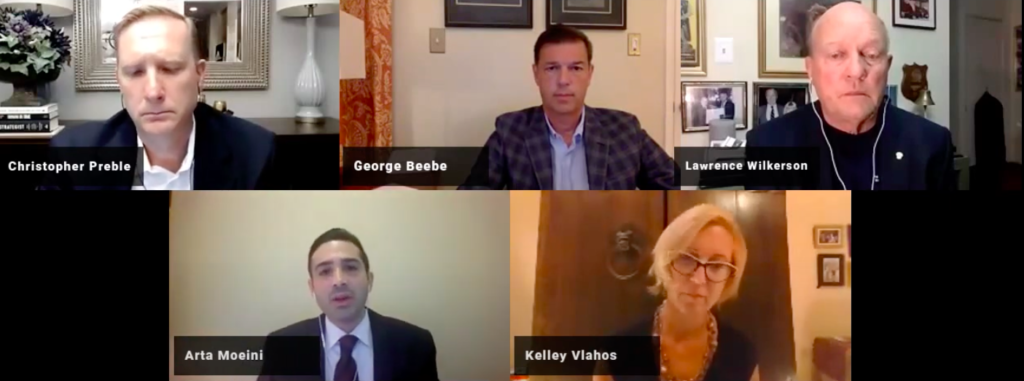
To finish the discussion, the panelists each answered a quick lightning-round question about whether they believe there is anything that could spur positive change moving forward.
Christopher and Lawrence both expressed hope for the younger generation, which realize the shortcomings of using military force as an instrument of American power and influence, and are instead open to other tools of global engagement. George expressed optimism that the U.S. is finally coming to grips with the limitations of its power and of what it can realistically aspire to in the future, reconciling its objectives with its capabilities. Arta ended by expressing hope while also asserting that there must be vigilance about the challenges ahead. Currently, there is a critical juncture where the Anglo-Saxon sphere and the rest of the world have awoken to the pathology and debilitating effects of global hegemony and the double myths of indispensability and exceptionalism. If the U.S. projects its values upon others, without adopting a globally pluralist view and an understanding that its way of life is distinctive to itself, there will be backlash which will ultimately be disruptive to peace.

